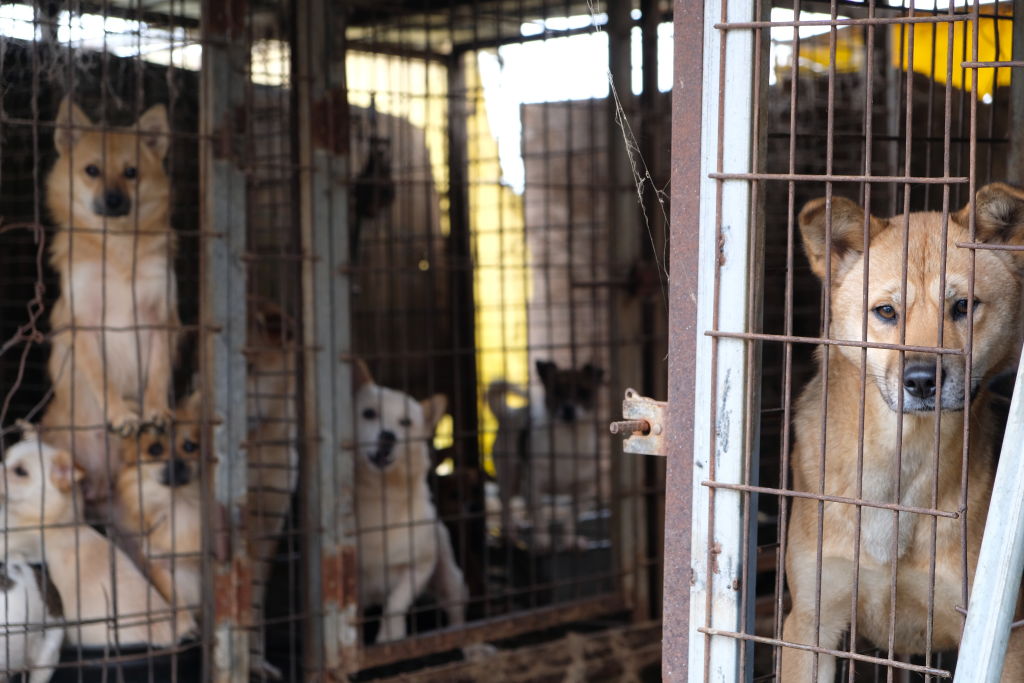“They have been examined and our vets don’t feel the symptoms are related to the new, mysterious illness,” Kezirian said, noting that the kennels were reopened Friday.
The kennels are typically open to the public so people considering adoption can meet the animals.
“Even when our kennels are closed, we are open to the public and for adoptions,” Kezirian said. “The difference is that we will bring the dogs out for the public to meet rather than have them walk through the kennels.”
Identifying the illness can be difficult because the symptoms are similar to another respiratory ailment: kennel cough.
Shelly Pancoast, president of the Rhode Island Veterinary Medical Association, said veterinarians in Rhode Island have been “seeing cases of an unusual respiratory syndrome since 2022.”
“Pneumonia in previously healthy adult dogs was exceedingly rare before this, and we started seeing cases of pneumonia in dogs that had been exposed to other dogs in kennels, daycare, etc., around the summer of 2022,” she said.
At the same time, she said, primary care veterinarians reported more severe cases of kennel cough, which she said is a name for a number of different viruses and bacteria that can cause coughing in dogs that may last for weeks or months.
Pancoast is an emergency veterinarian who works primarily at Bay State Veterinary Emergency and Specialty Services in Swansea, and, for many years, worked at its sister hospital, Ocean State Veterinary Specialists in East Greenwich. She and fellow veterinarians noticed cases coming from many different Rhode Island towns as well as Southeastern Massachusetts.
“Because this is so new, there are no studies and everything we have to report is observational only,” Pancoast said. “It appears that most dogs who get sick will only have a prolonged cough and will recover fully, and it is unclear what specific treatment aids in their recovery.”
“Rarely, we see dogs who were initially coughing develop pneumonia (an infection of the lungs), and we typically treat these dogs with antibiotics, oxygen if they require it, and monitor them closely,” she said.
“In our experience, the vast majority of these dogs will recover fully,” Pancoast said. “Very rarely, we can see dogs go into respiratory failure and require ventilation, and some of these dogs have died.”
The DEM's Healey said his agency is aware of “a small number of dogs in the state that died or were euthanized after experiencing similar signs. Unfortunately, these dogs weren’t subjected to a postmortem examination, so the cause of their illness was not determined.”
Who is studying the mysterious canine illness?
The DEM is encouraging veterinarians to send samples to the University of New Hampshire’s Veterinary Diagnostic Laboratory for testing and diagnosis, Healey said.
At UNH, senior veterinary pathologist David Needle has been studying the disease for more than a year. Researchers at the university have been examining samples from Oregon, New Hampshire, Massachusetts and Rhode Island and are slated to begin receiving samples from Colorado and Illinois this week, he said.
Needle told USA Today the dogs who have contracted the disease and died had underlying issues. He believes the illness is spread through close contact and breathing the same air as an infected animal.
In Warwick, Tim Bedard, co-owner of Metropet Dog Center, which provides daycare and boarding for dogs, has noticed some concern among customers. Metropet takes many precautions to keep dogs safe, he said. For example, dogs must be up to date on their vaccinations and will be turned away or sent home if they're brought in sick.
“Our approach is always dog safety, no matter what,” he said. “We're constantly cleaning.”
The business typically hosts from 35 to 60 dogs. Pet owners might be boarding their dogs during the workday, while people taking vacations will board them for extended periods, Bedard said.
“It's peace of mind for them, whether they're going on vacation or going to work,” he said.
What should dog owners do to keep their pets safe?
Bedard doesn't believe dog owners should overreact but keep their “guard up a little bit” and “pay close attention” to the health of their pets.
Pancoast said, “It is important to note that most dogs who go to daycare or are kenneled will not get sick, but a small number will. Avoiding crowded dog parks, and ensuring that the kennel or daycare you choose has safety and illness reporting measures in place is the best thing you can do to keep your dog safe.”
“Also, making sure your pet is up to date on all of their vaccines, including the kennel cough vaccine, is always important,” she said.
Pancoast had the following advice for dog owners:
“If your dog has a cough that lasts for more than 24 hours, you should contact your primary care veterinarian first,” she said. “It's important to note that there is a national shortage of veterinarians, so your vet may not be able to see your pet right away, and it's unclear whether treatment with antibiotics makes a difference in dogs that are just coughing.”
“If your pet is very lethargic or is having labored breathing at rest as well as a cough, this would be a situation where you should contact an urgent care or an ER,” Pancoast said.
With reports from USA Today and the Associated Press




